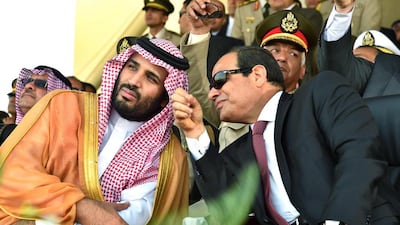NEW YORK // The Arab League on Friday welcomed the signing of a pact that bolsters military and economic ties between Egypt and Saudi Arabia.
The agreement, signed on Thursday, was aimed at underscoring the strategic importance of the countries’ relationship as Riyadh seeks to rally Sunni Arab support to counter Iran and fight extremist groups.
Arab League secretary general Dr Nabil Al Arabi said the agreement reflects progress towards further joint Arab military action and would contribute to discussions at the upcoming Arab defence ministers meeting on August 27.
Saudi Arabia’s defence minister and deputy crown prince, Mohammed bin Salman, had led a delegation to Cairo and met with Egyptian president Abdel Fattah El Sisi.
Thursday’s agreement, which the leaders called the “Cairo Declaration”, pledges increased military cooperation, including the formation of a joint Arab military force for interventions in regional crises, and for increased economic ties through “mutual investment” in energy and transport.
“At this current period which the Arab world is facing, we need to work together, because the threats are many, and we will not overcome them unless we work together,” Mr El Sisi said. “Egypt and Saudi Arabia are the two pillars of Arab national security, and together we can confront these challenges.”
Since the removal of the Muslim Brotherhood-backed Egyptian president, Mohammed Morsi, Saudi Arabia and the UAE have given billions of dollars in aid and investment to Cairo, viewing the country’s stability as key to overall regional stability and their national interests.
But a number of recent public differences over regional issues have led some to perceive growing tension between Riyadh and Cairo. Prince Muhammed’s visit was intended to send a message that the core strategic interests and relationship between the allies remains unshaken, observers said.
“I think the visit was designed to end speculation and open a new public page,” said Mustafa Alani, a security analyst with close ties to Riyadh. “They recognise that Egypt has different views and possibly interests in a number of regional issues but they still believe that on the strategic objective there is no disagreement.”
Under the new leadership of King Salman, Riyadh’s regional policy has taken a different direction than under his predecessor and focused on banding together Sunni forces in the region to counter Iran’s projection of power.
“The adoption of a reappraisal with respect to regional policy has affected [Saudi ties with] Egypt,” said Michael Hanna, an expert on Egyptian and Gulf policy at The Century Foundation think tank in New York.
Saudi Arabia has taken a more pragmatic stance toward Brotherhood-affiliated groups in places like Yemen and Syria, and has recently courted Hamas, possibly to turn its back on Tehran. This has strained relations with Egypt, the analysts said, as did Cairo’s refusal to participate in ground operations against Houthi rebels in Yemen.
Mr El Sisi’s government has also taken a different position on Syria and is primarily concerned with the proliferation of militancy there, with little interest in backing rebels to overthrow the Al Assad regime. The Egyptian foreign ministry this week condemned the Turkish “safe zones” plan as a breach of Syrian sovereignty.
Despite this, both Egypt and Saudi Arabia have an underlying interest in maintaining their close ties that trumps the recent differences over regional policy.
“We haven’t seen any of these differences yet affect the strategic logic of the bilateral relationship,” Mr Hanna said. “Both parties realise they need the other for various things and this trip was a kind of relationship tending exercise.”
tkhan@thenational.ae

